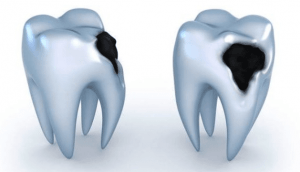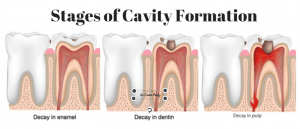Dental cavities are holes in teeth that result from the acidic byproducts produced by oral bacteria. Once your tooth develops a cavity, you need to have it fixed by the dentist. Cavities never fix themselves. They only get bigger and bigger if left untreated. Visit your local dentist if you suspect that your teeth have cavities. You need to have them evaluated and treated before your cavity turns into an actual toothache!

Tooth cavities are formed as harmful bacteria produce acids that destroy the tooth
What causes tooth cavities?
Dental cavities are formed when you don't clean the teeth. Food particles attach themselves to the teeth' surfaces. Bacteria attach themselves to the tooth and create what's known as plaque. These harmful bacteria process food particles to produce acids. The acid slowly dissolves the tooth and creates a hole in the tooth. This hole is known as a dental cavity.

Cavities never fix themselves and they only get bigger if left untreated
At what age am I at risk for dental cavities?
You can develop tooth cavities at any age. You're at risk of developing cavities so long as you have natural teeth in your mouth,. Children, adults, and seniors can all develop cavities in their teeth. Children who eat lots of sugar and don't clean their teeth properly will develop cavities on their baby teeth. Since children start teething at about 6 months, you can have your first cavity when you're not under one year old. The adult teeth start coming out when you’re around 6 to 7 years old. If you’re not caring for your teeth, you will develop cavities on the adult teeth soon after they erupt. Typically, childhood and college years are when you're most susceptible to developing new cavities. After that, we spend the rest of our lives fixing and repairing tooth fillings as teeth break, become damaged, or get infected. Seniors aren't as likely to develop new tooth cavities. Instead, they develop recurrent cavities around existing dental restorations. Recurrent cavities appear underneath old fillings and crowns. As long as you have natural teeth, you are susceptible to developing dental cavities.
Which teeth surfaces are most likely to develop cavities?
While cavities can develop anywhere on the tooth, they tend to have a preference for the deep groves on teeth surfaces. These deep grooves trap more food particles and it's easy for the bacteria to accumulate in them. The most common location for cavities is on the chewing surfaces of the back teeth. The next most common area for cavities is in between the teeth. These are known as interproximal cavities and are common in people who do not floss their teeth. The only way to prevent food and bacteria from gathering on your teeth and causing cavities is to clean your teeth thoroughly each and every day. This is why it's so important to brush and floss your teeth regularly.
What happens if I ignore my dental cavities?
Tooth cavities typically start off on the outer tooth surface. These are the areas that accumulate sugar and bacteria. From there, they work their way toward the tooth nerve. If you neglect to fix your cavity, the bacteria continue eating their way toward the center of the tooth. Sooner or later they reach your tooth nerve. Once this happens, your tooth becomes infected which results in a severe toothache. The best way to avoid this from happening is to fix your cavity in its earlier stages. Small to medium-sized dental cavities can easily be fixed with a filling. Once a cavity reaches the tooth nerve, a simple filling is no longer an option. At this point, you either need to fix your tooth with a root canal treatment or extract the tooth.

Cavities cause a toothache once they reach your tooth nerve
How can I stop cavities from developing in the first place?
The best way to stop cavities is to prevent food and bacteria from gathering on your teeth. Here are some tips on how you can prevent cavity formation in your teeth:
- Healthy diet - Maintain a healthy diet, especially one that limits the use of processed sugars. Cavity bugs love sugars, particularly processed sugar that is found in sweets, candies, and sodas. Minimize your sugary intake or get in the habit of rinsing or brushing your teeth after you consume sugary items.
- Regular brushing & flossing - You should brush and floss your teeth thoroughly at least once a day. Otherwise, food and plaque accumulate on your teeth and cause cavities.
- Periodic checkups & cleanings - Visiting your dentist regularly is a great way to make sure that your teeth are cavity-free. Your dentist will take X-rays to check for cavities. They will also clean your teeth and review your oral hygiene habits. They may also offer additional preventive dental treatments to help reduce the chances of cavities developing in the future.
0 Comments